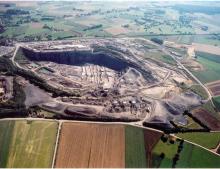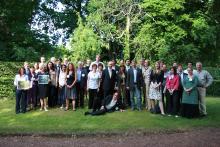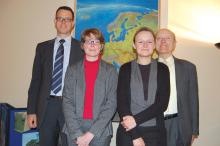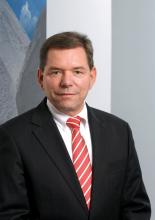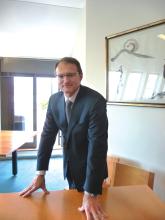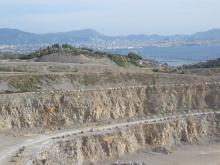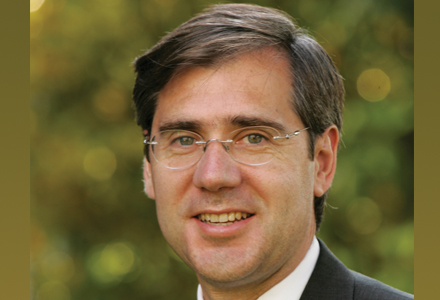
Improving and promoting sustainability is a key task for the aggregates industry, according to Cemex's new president for global energy and sustainability ignacio madridejos. Claire Symes reports
The days when the involvement of companies producing aggregates in the materials ended when the material left the quarry gates, or when the last reserves are exhausted, are over.
Today's quarry operators take a much more holistic view of the sector and get involved at local level with communities and with customers on a regional, national and global scale.
The extent of this commitment and the will to drive this forward at
"A key part of my role has always been leading Cemex's sustainability initiative," he explained. "The project aims to share best practice and look at where the company should be in terms of sustainability." According to the company, Madridejos' promotion as president of the global energy and sustainability function adds weight to his focus in this area.
Madridejos' daily functions as regional president involve visiting the company's sites, factories and project in the Northern Europe region and helping to develop new initiatives to improve not just productivity but also sustainability. He tries to visit each of the countries that are within his region each month to ensure he maintains a connection with the operations.
The kinds of projects that the company's sustainability initiative gets involved in are wide-ranging and extend well beyond restoration of exhausted quarry sites and efficient use of resources within Cemex's sites. The initiative takes a much broader social responsibility role and one the biggest projects is helping to develop affordable housing in countries where Cemex operates.
"The housing initiative is one of our main challenges," explained Madridejos.
"We are using the scheme to help with the financing when it comes to buying materials for people to build their own houses. Having a safe place to live should be one of the basic expectations in life for everyone and the programme is helping to improve the situation for communities." Madridejos believes that the commitment to sustainability for Cemex extends beyond just the delivery of the building materials and said that the industry has a responsibility to help reduce emissions, while still developing infrastructure. "It is important for us to be involved in developing the efficient cities of the future with less transport," he said.
Nonetheless, he is well aware that the needs of the environment start with the extraction of aggregates and said that Cemex is committed to reducing its carbon footprint and recycling is becoming more important. "We have a full range of activities committed to this in terms of research and development and innovation," he said. Madridejos pointed to the recent development of a global concrete standard as one example of this.
Another development of the group - which numbers over 600 people worldwide and interacts via an internal networking site - is the company's carbon calculator tool. "This came out of a number of different countries developing systems to do the same thing so we have brought this knowledge together and packaged it so it can be applied by any of our operations worldwide." Madridejos points to Cemex's involvement with Bird Life as another example of how the company is working to improve operation of its quarries to benefit nature at both a local and international level. "As part of the partnership we have analysed all our quarries to identify potential for further improvement in terms of habitats for birds," he said. "Bird counts and picture competitions are an on going part of the programme. Quarries are ideal habitats for birds - they are very natural and the birds are often happy to live alongside the machines, especially as public access is prevented. This really contributes to society." According to Madridejos, being a good citizen is important for the business as well as society. "Quarries are there for 20 to 30 years and without doing a good job in the eyes of local people, there will be no renewals." Madridejos acknowledges that the key to the success of these initiatives and understanding where the company needs to go next is being close to the customer.
This is something where his previous career before joining Cemex plays an important role.
Madridejos is a civil engineer by training and undertook a six-year masters degree in the subject at University Polytechnica Madrid in Spain after which he joined Agroman - now part of
This career path has given him an in-depth understanding of the wider construction industry from both the customers' and designers' point of view, as well as that of the quarry producer.
Madridejos said he was inspired to move into the construction industry because he liked the idea of creating new structures from nothing. "Building a bridge or house is rewarding," he said. "It creates useful things." According to Madridejos, the aggregates industry is a vertical integration of that as it provides the materials to create new structures.
"There are many areas where aggregates contribute," he said. "As a local material the footprint is actually quite small compared to products like timber and steel. This local nature means that it is very important for us to be involved at that level with communities and government.
"Quarries are there for a long period of time so the relationship with communities is key and takes in all aspects of the operation.
Career path Madridejos joined the company 15 years ago and is originally from Madrid, where he is now based, but his career with Cemex has taken him on a journey through Central and North America and North Africa, as well as Europe
.
"I started as a manager for strategic planning in Madrid but after a year I moved to Mexico to take on a similar role for 12 months, before I moved into the international department covering Columbia and Panama," he said. "From there I moved back to Spain for a while as vice president of strategic planning for the country and then transferred to Egypt for three years in 1999 when the company first moved into the market there." In 2003, Madridejos moved back to Spain again and took charge of the country's aggregates operations for five years. "In 2008 I moved to the UK to take on the president's role for the Northern Europe region, which then covered countries including the UK, France, Germany and Scandinavia," he explained.
In 2009, Cemex restructured its regional organisation in Europe and Madridejos was transferred to his previous role covering the Western Europe area.
The most recent restructure means that he is combining his presidency of Cemex's sustainability function with that of Northern Europe and he is responsible for the operations in the UK, Ireland, Germany, France, Poland, Czech Republic, Latvia, Austria , Hungary and Scandinavia.
He acknowledges that the situation in some countries within his region has been difficult in the last few years.
economy "The financial crisis started to impact the aggregates market at the start of 2008 and there have been a couple of years with relaxed demand," said Madridejos. "Each of the markets reacted differently though.
In Spain there was a dramatic reaction - in Ireland too - with a 50% fall in demand.
"This was difficult to deal with as a business but we have to adapt to the new market. I don't see a recovery in these markets to 2007 levels so we have to adapt to the new reality.
"The reduction in the rest of Europe was lower and we expect recovery to previous levels in time. Poland is recovering faster than other countries
The market in Germany is also good but here markets were at a lower level before the crisis as the country had only just pulled out of its own recession.
"It is too early to tell this year how the markets are recovering. The first quarter cannot be compared to 2010 as the first three months of last year were impacted by poor weather, which we have not seen this year," he said. "In Spain we expect a 9% reduction this year but we are forecasting a small growth in the UK, France and Germany." Industry Issues Madridejos is also keen to get involved in industry-wide issues and is currently vice president of the pan-European cement producers association
"Resources are a big issue for the industry," said Madridejos. "Aggregates are needed for development and, same as Natura 2000 has developed a road map for nature, the Communication on the Raw Materials Initiative will help create a road map for the need for aggregates. It has been clearly demonstrated that there is space for both nature and aggregates.
"Locally there are problems gaining access to resources but the road map will help. It is up to the industry to build relationships too and demonstrate the positive things that are possible through managing biodiversity and restoration.
"The industry is improving but there is a lot of press on bad examples of our industry's work and there needs to be more communication about the good practices. Initiatives like European Minerals Day do help." Cemex is also working closely with children, particularly in Spain, to build understanding of the need for aggregates.
"Children are the citizens of the future so it is important for them to understand all aspects of the industry including the biodiversity improvements, energy efficiency and recycling as a joined-up message."

